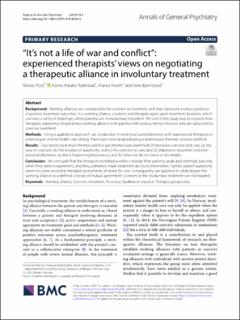| dc.contributor.author | Prytz, Marius | |
| dc.contributor.author | Harkestad, Karina Natalie | |
| dc.contributor.author | Veseth, Marius | |
| dc.contributor.author | Bjørnestad, Jone Ravndal | |
| dc.date.accessioned | 2020-03-18T08:36:15Z | |
| dc.date.available | 2020-03-18T08:36:15Z | |
| dc.date.created | 2019-07-04T09:43:00Z | |
| dc.date.issued | 2019-06 | |
| dc.identifier.citation | Prytz, M., Harkestad, K.N., Veseth, M. et al. (2019) “It’s not a life of war and conflict”: experienced therapists’ views on negotiating a therapeutic alliance in involuntary treatment. Annals of General Psychiatry, 18. | nb_NO |
| dc.identifier.issn | 1744-859X | |
| dc.identifier.uri | http://hdl.handle.net/11250/2647311 | |
| dc.description.abstract | Background
Working alliances are considered to be essential to treatment, and they represent a robust predictor of positive treatment outcomes. In a working alliance, a patient and therapist agree upon treatment decisions, which can raise a series of challenges when patients are in involuntary treatment. The aim of this study was to research how therapists experience negotiating a working alliance with patients with serious mental illnesses who are subjected to coercive treatment.
Methods
Using a qualitative approach, we conducted 10 semi-structured interviews with experienced therapists in a Norwegian mental health care setting. Transcripts were analysed using a team-based thematic analysis method.
Results
Two interrelated major themes and five sub-themes were identified: (1) between coercion and care; (a) the ease of coercion, (b) the paradox of autonomy, and (c) the coercion as care; and (2) imperative treatment and interpersonal dilemmas; (a) this is happening between us and (b) when we do not meet in the middle.
Conclusion
We conclude that the therapists exhibited a will to consider their patients’ goals and methods, but only when they were in agreement, and they ultimately made treatment decisions themselves. Further, patient autonomy seems to come second in therapist assessments of needs for care; consequently, we question to what degree the working alliance as a defined concept of mutual agreement is present in the involuntary treatment we investigated. | nb_NO |
| dc.language.iso | eng | nb_NO |
| dc.publisher | BioMed Central | nb_NO |
| dc.rights | Navngivelse 4.0 Internasjonal | * |
| dc.rights.uri | http://creativecommons.org/licenses/by/4.0/deed.no | * |
| dc.subject | psykiatri | nb_NO |
| dc.subject | tvungen behandling | nb_NO |
| dc.subject | tvangsbehandling | nb_NO |
| dc.subject | terapi | nb_NO |
| dc.subject | psykisk helse | nb_NO |
| dc.title | “It’s not a life of war and conflict”: experienced therapists’ views on negotiating a therapeutic alliance in involuntary treatment | nb_NO |
| dc.type | Journal article | nb_NO |
| dc.type | Peer reviewed | nb_NO |
| dc.description.version | publishedVersion | nb_NO |
| dc.rights.holder | © The Author(s) 2019 | nb_NO |
| dc.subject.nsi | VDP::Medical disciplines: 700::Clinical medical disciplines: 750::Psychiatry, child psychiatry: 757 | nb_NO |
| dc.source.pagenumber | 10 | nb_NO |
| dc.source.volume | 18 | nb_NO |
| dc.source.journal | Annals of General Psychiatry | nb_NO |
| dc.identifier.doi | 10.1186/s12991-019-0234-6 | |
| dc.identifier.cristin | 1710009 | |
| cristin.unitcode | 217,7,3,0 | |
| cristin.unitname | Institutt for sosialfag | |
| cristin.ispublished | true | |
| cristin.fulltext | original | |
| cristin.qualitycode | 1 | |

